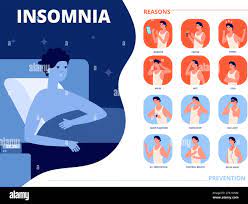Anxiety-Induced Insomnia: Understanding the Connection and Finding Relief
Insomnia, the inability to fall asleep or stay asleep, can be a frustrating and debilitating condition. When anxiety enters the mix, it can exacerbate insomnia symptoms and create a vicious cycle of sleeplessness and worry. Anxiety-induced insomnia is a common issue that affects many individuals, but understanding the connection between anxiety and sleep disturbances is the first step toward finding relief.
The Link Between Anxiety and Insomnia
Anxiety and insomnia often go hand in hand, with each condition feeding into the other. When we experience anxiety, our minds are in a heightened state of alertness, making it difficult to relax and fall asleep. Racing thoughts, worries about the future, or replaying past events can keep us awake at night, leading to sleep deprivation and increased anxiety levels.
Effects of Anxiety-Induced Insomnia
The effects of anxiety-induced insomnia can be far-reaching and impact various areas of our lives. Sleep deprivation can lead to fatigue, irritability, difficulty concentrating, memory problems, and decreased performance at work or school. Chronic insomnia linked to anxiety can also contribute to long-term health issues such as weakened immune function, weight gain, and an increased risk of developing mood disorders like depression.
Managing Anxiety-Induced Insomnia
Fortunately, there are strategies that can help manage anxiety-induced insomnia and improve sleep quality:
- Establish a bedtime routine: Create a calming bedtime routine that signals to your body that it’s time to wind down. This could include activities like reading a book, taking a warm bath, or practicing relaxation techniques.
- Avoid stimulants: Limit caffeine intake in the afternoon and evening as it can interfere with your ability to fall asleep. Similarly, avoid screens (phones, tablets, computers) before bed as the blue light emitted can disrupt your natural sleep-wake cycle.
- Practice relaxation techniques: Techniques such as deep breathing exercises, meditation, or progressive muscle relaxation can help calm your mind and body before bedtime.
- Seek professional help: If anxiety-induced insomnia persists despite self-help strategies, consider seeking support from a healthcare provider or mental health professional. Therapy or medication may be recommended to address underlying anxiety issues.
Conclusion
Anxiety-induced insomnia is a challenging condition that requires attention and proactive management. By understanding the link between anxiety and sleep disturbances and implementing effective coping strategies, individuals suffering from this issue can take steps toward better sleep quality and improved overall well-being.
If you are experiencing persistent anxiety-induced insomnia symptoms that are impacting your daily life, don’t hesitate to reach out for professional help. Remember that you are not alone in this journey toward better sleep and mental health.
8 Unexpected Benefits of Anxiety-Induced Insomnia: From Self-Discovery to Enhanced Empathy
- Heightened awareness of mental health
- Opportunity for personal growth and self-discovery
- Increased empathy and understanding towards others with similar struggles
- Motivation to adopt healthier lifestyle habits for better sleep hygiene
- Development of coping mechanisms and resilience in managing anxiety
- Greater appreciation for moments of calm and relaxation
- Potential to seek professional help and guidance for overall mental well-being
- Recognition of the importance of prioritizing self-care and stress management
The Detrimental Effects of Anxiety-Induced Insomnia: Mood, Mind, Immunity, and Performance at Stake
- Increased risk of developing mood disorders like depression
- Impaired cognitive function, concentration, and memory
- Weakened immune system and increased susceptibility to illnesses
- Negative impact on work or academic performance due to fatigue and irritability
Heightened awareness of mental health
An unexpected pro of anxiety-induced insomnia is the heightened awareness it brings to mental health. When individuals experience sleep disturbances due to anxiety, they are often prompted to reflect on their emotional well-being and seek support or resources to address underlying issues. This increased awareness can lead to proactive steps towards improving mental health, such as seeking therapy, practicing self-care, or adopting healthy coping mechanisms. By shining a light on the importance of mental health and encouraging individuals to prioritize their well-being, anxiety-induced insomnia can serve as a catalyst for positive change and personal growth.
Opportunity for personal growth and self-discovery
An overlooked pro of anxiety-induced insomnia is the opportunity it presents for personal growth and self-discovery. While the sleepless nights may be challenging, they can also serve as a catalyst for introspection and reflection. In the quiet hours of the night, individuals may find themselves delving deep into their thoughts and emotions, uncovering hidden fears, desires, and strengths. This period of heightened awareness can lead to profound insights, helping individuals better understand themselves and their inner workings. Through this process, individuals may discover new coping mechanisms, resilience, and a deeper sense of self-awareness that can ultimately contribute to personal growth and development.
Increased empathy and understanding towards others with similar struggles
One potential pro of anxiety-induced insomnia is the increased empathy and understanding it can cultivate towards others facing similar struggles. Going through the challenges of sleepless nights and heightened anxiety can create a deep sense of empathy for those experiencing similar difficulties. This shared understanding can lead to greater compassion, support, and connection with others who are navigating their own battles with anxiety-induced insomnia. By walking in their shoes, individuals may develop a heightened sensitivity and willingness to offer comfort and solidarity to those in need, fostering a sense of community and shared strength in facing common struggles.
Motivation to adopt healthier lifestyle habits for better sleep hygiene
An interesting pro of anxiety-induced insomnia is that it can serve as a motivating factor for individuals to adopt healthier lifestyle habits and prioritize better sleep hygiene. When faced with the challenges of sleeplessness due to anxiety, individuals may be more inclined to make positive changes such as establishing a consistent bedtime routine, reducing caffeine intake, practicing relaxation techniques, and seeking professional help. This newfound motivation to improve sleep quality can lead to overall better health outcomes and a greater sense of well-being.
Development of coping mechanisms and resilience in managing anxiety
One potential benefit of anxiety-induced insomnia is the development of coping mechanisms and resilience in managing anxiety. When faced with the challenge of disrupted sleep due to anxiety, individuals may be motivated to explore and adopt various strategies to calm their minds, relax their bodies, and improve their overall well-being. Through this process, they can cultivate resilience by learning how to navigate and cope with anxious thoughts and emotions effectively. Over time, these individuals may develop a deeper understanding of themselves and their triggers, ultimately strengthening their ability to manage anxiety not only in relation to sleep but also in other aspects of their lives.
Greater appreciation for moments of calm and relaxation
One potential benefit of anxiety-induced insomnia is the greater appreciation for moments of calm and relaxation. When faced with persistent anxiety and difficulty sleeping, individuals may develop a heightened awareness of the value of peace and tranquility. This increased sensitivity to moments of calm can lead to a deeper appreciation for simple pleasures, such as a quiet evening at home, a peaceful walk in nature, or a moment of mindfulness. By recognizing the importance of these serene interludes, individuals experiencing anxiety-induced insomnia may cultivate a more profound sense of gratitude and contentment in their daily lives.
Potential to seek professional help and guidance for overall mental well-being
One potential benefit of anxiety-induced insomnia is the opportunity it provides to seek professional help and guidance for overall mental well-being. When struggling with sleep disturbances caused by anxiety, individuals may be motivated to reach out to healthcare providers, therapists, or counselors for support. This proactive step can lead to a deeper exploration of underlying anxiety issues and the development of coping strategies to improve both sleep quality and mental health. Seeking professional help for anxiety-induced insomnia can be a crucial first step towards holistic well-being and long-term resilience.
Recognition of the importance of prioritizing self-care and stress management
An overlooked benefit of anxiety-induced insomnia is the recognition it brings to the importance of prioritizing self-care and stress management. When faced with sleep disturbances caused by anxiety, individuals are prompted to explore and implement strategies that promote relaxation, mindfulness, and overall well-being. This heightened awareness often leads to a deeper understanding of the need for self-care practices such as regular exercise, healthy eating, meditation, and setting boundaries to manage stress effectively. By addressing the root causes of anxiety-induced insomnia through self-care and stress management techniques, individuals can not only improve their sleep quality but also enhance their overall quality of life.
Increased risk of developing mood disorders like depression
One significant con of anxiety-induced insomnia is the increased risk of developing mood disorders such as depression. Chronic sleep deprivation resulting from ongoing anxiety-related sleep disturbances can disrupt the delicate balance of neurotransmitters in the brain, leading to changes in mood regulation. The persistent feelings of sadness, hopelessness, and lack of interest that characterize depression can be exacerbated by the physical and emotional toll of inadequate sleep, creating a challenging cycle that impacts overall mental health and well-being. It is crucial to address anxiety-induced insomnia promptly to mitigate the risk of developing more serious mood disorders like depression.
Impaired cognitive function, concentration, and memory
Anxiety-induced insomnia can lead to impaired cognitive function, concentration, and memory. When sleep is disrupted due to anxiety, the brain struggles to perform at its optimal level, resulting in difficulties with focus, problem-solving, and retaining information. Persistent sleep deprivation caused by anxiety can hinder cognitive abilities, making it challenging to perform daily tasks effectively and impacting overall productivity. Additionally, memory consolidation processes during sleep are disrupted, affecting the ability to recall information and learn new things efficiently. It is crucial to address anxiety-induced insomnia to prevent long-term cognitive decline and maintain mental acuity.
Weakened immune system and increased susceptibility to illnesses
Anxiety-induced insomnia can have a significant negative impact on our immune system, making us more vulnerable to illnesses. When we don’t get enough quality sleep due to anxiety-related sleep disturbances, our body’s ability to fight off infections and maintain overall health is compromised. Chronic sleep deprivation can disrupt the balance of essential immune cells and molecules in our body, leading to a weakened immune response and an increased susceptibility to illnesses such as colds, flu, and other infections. Prioritizing strategies to manage anxiety-induced insomnia is crucial not only for improving sleep quality but also for supporting a strong and resilient immune system.
Negative impact on work or academic performance due to fatigue and irritability
Anxiety-induced insomnia can have a significant negative impact on work or academic performance due to the resulting fatigue and irritability. When individuals are unable to get sufficient restorative sleep due to anxiety-related sleep disturbances, they often experience decreased energy levels, difficulty concentrating, and heightened irritability. These factors can impair cognitive function, decision-making abilities, and overall productivity in professional or academic settings. Persistent fatigue and irritability stemming from anxiety-induced insomnia can lead to decreased performance quality, increased errors, and challenges in meeting deadlines, ultimately affecting one’s success and well-being in the workplace or educational environment.


